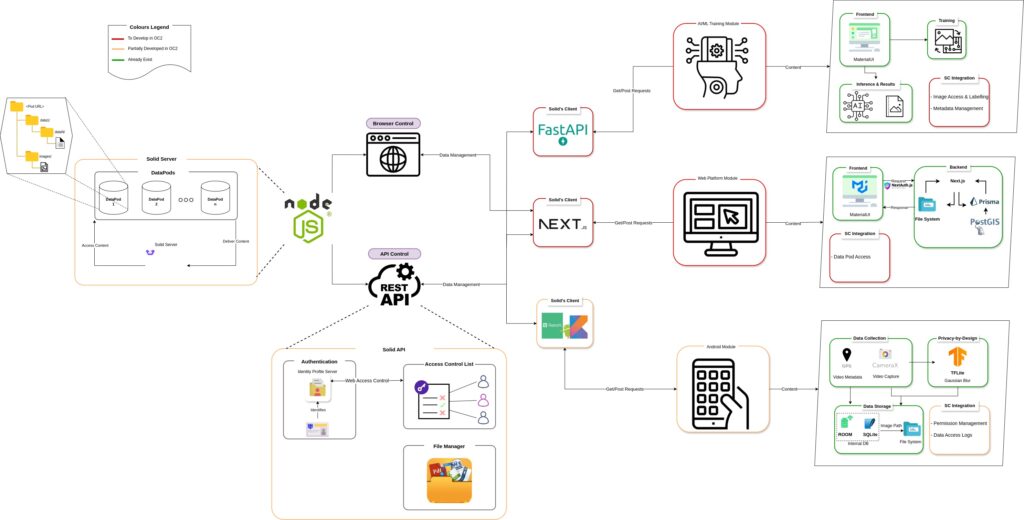DUME

Project DUME goal is to redefine digital media sharing by prioritizing user privacy, security, and control. Born from the Theia Vision digital platform, DUME addresses the critical need for data sovereignty in our increasingly digital world. Central to its mission is the transition from the traditional centralized data handling model to a decentralized architecture, empowering users to manage their data through personal data pods.
At the heart of DUME is the extension of the Solid Protocol, tailored to manage extensive media datasets, including high-resolution images and associated metadata. The project focuses on developing advanced, efficient data retrieval methods, ensuring rapid access crucial for AI-driven applications. It introduces robust indexing mechanisms for bidirectional data exchange control, allowing users to maintain authority over their data’s metadata. Furthermore, DUME integrates dynamic data versioning to handle the continuous influx of new media content.
DUME’s integration with Theia Vision is pivotal, enhancing the platform’s capabilities while safeguarding user privacy and data control. The project’s commitment to user empowerment is assured by its approach to data privacy and security, addressing prevalent concerns in our digital era.
As an open-source protocol, DUME invites collaboration, fostering innovation and broad adoption. Its implications extend beyond Theia Vision, offering a versatile framework applicable to various digital platforms dealing with large-scale media data. Project DUME is not just a technological advancement; it’s a step towards a more decentralized, secure, and user-centric digital ecosystem, aligning technological progress with the core values of user privacy and autonomy.

Repositories:
- Motivation for the project: Project DUME introduces essential decentralized data control protocols and components, enhancing TrustChain ecosystem with privacy and user sovereignty. It also sets an example for digital platforms to prioritize user data control, thereby fostering a more secure and user-empowered digital landscape.
- Generic use case description: For any digital platform exchanging user-generated images, like social platforms, DUME enables users to upload content, control their data in personal pods, and selectively grant access, combining privacy with seamless media based interaction.
- Essential functionalities: Decentralized Data Storage: Users store media in personal pods, maintaining full control. User-Controlled Access: Users manage who accesses their data. Seamless Integration: Easily integrates with existing digital platforms for many application domains (e.g. AI model training).
- How these functionalities can be integrated within the software ecosystem: DUME will create software components for the TrustChain ecosystem, offering solutions for: 1) Decentralized Storage modules for user-driven media pods, 2) Access Control interfaces for user-defined data permissions, and 3) Integration APIs for compatibility across diverse digital ecosystems.
- Gap being addressed: Project DUME addresses the gap in user data sovereignty and privacy in digital media sharing, providing decentralized storage and user-controlled access, seamlessly integrating with existing platforms.
- Expected benefits achieved with the novel technology building blocks: DUME's technology ensures user data sovereignty and privacy, strengthening user trust and confidence. This creates increased user engagement and retention on platforms like Theia Vision, as users feel secure in their interactions and control over their data.
-
Potential demonstration scenario: The Theia Vision platform is designed to cater to a variety of users, each of whom benefits from its core functionalities in distinct ways based on their specific operational needs and goals. By offering tailored service packages and flexible integration options, Theia Vision provides a highly adaptable solution that aligns with the diverse requirements of its users.
For public entities, Theia Vision serves as a crucial tool for urban management and oversight. Municipalities and government agencies can utilize the platform’s ability to detect and monitor urban issues such as waste management problems, infrastructure decay, or unauthorized constructions. Through the platform’s event detection capabilities, users receive real-time notifications of issues, complete with high-resolution images and geographic data. The reporting features provide invaluable insights into the frequency, location, and severity of occurrences, allowing public officials to allocate resources more effectively and track the progress of resolutions over time. This data-driven approach helps local governments improve the efficiency of city services while enhancing transparency in public space management.
For utility companies, the Street Navigation package offers substantial operational advantages. These companies—whether in electricity, gas, water, or sewage sectors—rely heavily on up-to-date geographical data to perform maintenance, inspections, or repairs. Theia Vision’s constantly refreshed imagery provides these users with an accurate, real-time view of infrastructure across wide geographic areas. This ability to visually monitor assets in the field without physical site visits reduces operational costs, improves response times, and enhances the overall maintenance workflow. The platform, through its navigational interface, becomes an essential tool for day-to-day operations, allowing these companies to streamline their activities and respond swiftly to potential issues in the field.
Private enterprises, particularly those in the recycling and advertising industries, benefit from Theia Vision’s ability to capture and analyze public space imagery in ways that support their specific business goals. Recycling companies, for example, can monitor waste management practices across urban areas, identifying illegal dumping sites or inefficient waste collection points. Theia Vision’s detailed reports allow these businesses to optimize their operational processes and improve the overall environmental impact of their services. Similarly, advertising agencies can leverage the platform to assess the state and visibility of billboards or outdoor advertising spaces, using real-time images to track performance and ensure compliance with location-based regulations.
For technology companies and AI developers, the API package opens a world of possibilities. These users are able to integrate Theia Vision’s capabilities directly into their own platforms, enhancing their existing solutions with powerful image recognition, data analysis, and geographic information functionalities. AI companies, in particular, can utilize the vast image datasets provided by Theia Vision to train their own models or develop new data-driven services. By accessing Theia Vision’s extensive urban monitoring data through an API, these companies can create new applications tailored to public space management or other sectors requiring real-time imagery and event detection.
Team

Nuno Rodrigues
PhD in Computer Science, is a seasoned leader in digital project management, with a rich background in national and European research initiatives.

João Feixa
MSc in Mechanical Engineering, excels as a systems optimization specialist and serves as the Commercial Director at Logimade, combining technical expertise with commercial experience.

André Torneiro
MSc holder in Electronics and Electrical Engineering, he is a skilled full-stack developer, specializing in back-end systems and integration.

Andreia Faria
PhD in As Logimade's B2B Area Manager, she brings extensive commercial experience, driving sales and forging strategic partnerships in relevant private sectors.

Inês Almeida
B2G Area Manager at Logimade, excels in selling digital smart city solutions to public entities, leveraging her substantial commercial experience.

Magda Duque
With over two decades in administration and client communication, is the Corporate Operations Manager at Logimade, ensuring smooth operations and client satisfaction.

David Aveiro
PhD in Computer Science and Information Systems Engineering, is a professor at the University of Madeira and senior researcher at ARDITI having a vast publication track record and experience in coordination of research projects involving themes of enterprise engineering, business modelling, digital innovation, among others.

Duarte Pinto
MSc in Software Engineering and certified FIWARE expert that works as a Researcher at ARDITI. His research domains include enterprise engineering, open-source smart solutions, information systems, e-government, open data, digital twins, data spaces, and FIWARE.

Dulce Pacheco
Researcher and professor with a PhD in Psychology, who possesses robust analytical and managerial skills. Her distinguished research portfolio is centred on organizational settings, highlighting her expertise in the evaluation of user feedback.
Entities

Logimade
Logimade is an innovative company, specializing in smart city solutions and digital platforms, dedicated to enhancing urban life through cutting-edge technology and strategic partnerships.
Website: www.logimade.com

ARDITI
ARDITI is the Regional Agency for the Development of Research, Technology, and Innovation in Madeira, with the mission of fostering research, technological advancement, and innovation to bolster sustainable economic growth and social cohesion.
Website: www.arditi.pt

